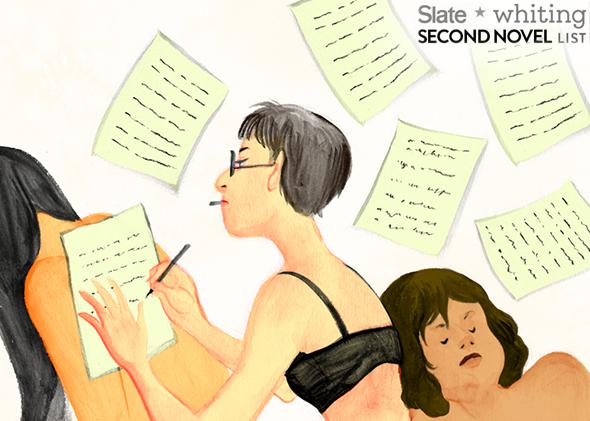Many New Yorkers suffer from a suspicion that they arrived here too late. Once, not so long ago, artists clustered in the Village, living in tiny, cheap apartments that squeezed them out onto the pavement, into theaters and music clubs. There was a fluidity between making work and hanging out; the art of New York painters and poets and novelists—the conversational wit, the spontaneity, the melding of high and low, pristine and dirty, from the ’50s up until the early ’80s, reflects this flow. Though you might yearn to, you can never hang out in that ragged, glittery New York—but you can hang out in Eileen Myles’s funny, wild, open-hearted version of it, in her second novel, Inferno. It will teach you that yearning has always been the primary emotion of New York’s artists.
Inferno—the second of the five books we judges are naming to We Second That: The Slate/Whiting Second Novel List—is about a young woman, Eileen Myles, who is newly arrived in New York. She’s plunged into the downtown scene of the ’70s, ferociously determined to write, desiring other women, stomping around town. The book feels like it was put down in gusts of inspiration, between drinking and sex and poetry readings. It can be read that way, too: between meals, on the toilet, or standing under an awning waiting for a break in the rain. Or you can sit with it for a while, in the wintry light of an apartment cased in steam heat, looking out the back window. But the streets are its true territory; its weather is the storm of language.
For Eileen, as for many young artists, becoming a poet means accumulating experience, almost any experience available. It doesn’t matter how revolting—sitting in basements with crazy people declaiming bad verse, or agreeing to be a whore for a night. Her flâneur’s search for the tawdry, the strange, people and things perfumed by garbage, is a poet’s cliché. But her language is not: Reading the book you think how there are as many ways to write novels as there are brains, processing memories, images, and sensations through their own weird labyrinths. Her vantage point is also fresh. I’ve read plenty of kunstlerromans about brave and suffering young men; I hadn’t, until now, read one by a lesbian poet from a working-class family in Boston, with a thrashing, generous intelligence. She explicitly models her book on Dante’s (it’s broken into three, with its own hell, purgatory, and heaven, aligning roughly with different phases in Myles’s sexual and poetic career). In doing so Myles asserts her ambition to imprint her particular set of experiences on the canon.
Or, as she puts it:
Yes where did I get the idea to write about myself. To use my own name. Is that natural?…Well I got the idea from Truffaut. All those boy coming-of-age movies. Also one day walking through the museum of Fine Arts in Boston with my family and we were heading to the Picasso this guy with black hair was talking on a monitor about his life. It was like a diary. I was like wait a second. That’s teevee. You can do that? Well then from now on everything I do will be that way. Absolutely. And I began taping then.
The book is made of anecdotes, strung together like bright amber beads. Some of my favorites are about sex—terrible sex and invigorating sex. Both kinds fill Eileen with power. A story about selling herself to an Italian businessman one night in her early 20s avoids the usual categories of violation vs. consent, volition vs. submission. She is much more interested in trying to get at a lyrical description of how it felt and looked. What she ends up with is a sensitive, sharp-edged piece of writing about indifferent sex with an older stranger in a gray midtown hotel room, a description that soars above the experience, rendering it both comical and sublime:
In the dark, the dark of that bed I think of grey, more colorless than childhood, we actually did it. I think of his penis which I believe was small but I thought of as Italian, kind of shapely and uncircumcised, is that possible? …He pushed his not-so-hard part into my not-so-defined part. I thought of this sexual experience as occurring in folds. It was like sex between two flowers. Not beautiful, but not unfriendly, occurring in slow weighty cascading silk…We grunted and plunged I think, not for long. I think I allowed and even enjoyed it in that I was witness to my body taking part in an animal unknown having made a deal as if I were my father and I had sold my daughter in exchange for some furs and a bottle of wine. I wasn’t so much in season as drifting through the yard, and the thought grew bright in my father’s head, why not her. I am that one.
Look what language can do! Look how it covers over the past, like soft snow. In the end, there’s no real question of having been used, because she uses the experience: It has given her exactly what she’d hoped for, a new set of sensations to be transformed into poetry.

Photo by Alice O’Malley
There are longueurs in the book, repetitions (another poetry reading in St. Mark’s Church?), but the language gathers energy, and then there is a sentence, or a paragraph, that is a bolt of originality:
On Hart Crane: “Hart produced in a flicker the veins he spied in a lover’s breast. His twists of attention made your breath go still.”
On performance of poems: “I mean I would definitely say poetry is a very roundabout way to unite both work and time. A poet is a person with a very short attention span who actually decides to study it. To look. To draw that short thing out. It’s an old, feudal idea. Finally what you see is the thing you have in common with everyone else.”
On sex: “Sex was a disordered prayer.”
Her language is both precise and messy, staggering toward meaning. There’s a sense of cheerful disorder, like a pile of papers being gleefully tossed around a bare room. Maybe the room is a loft, with creaky old floors and whitewashed walls. On the papers are clever aphorisms (“A lot of romance is just the swapping of alibis”), graceful line drawings, bits of ancient poetry, peculiar verbal expressions humorously shouted from a high window onto the street. Through this hectic burst of language, sped up because the observing consciousness is so alert, the reader senses a lucidity, an eye trained to see both farther and deeper than we can.
One more, her description of a Raymond Pettibone drawing of a girl:
Raymond Pettibone has one cartoon of a little girl with a gigantic mouth. The girl is all mouth. She is standing on a cliff with her mouth hanging open over a huge valley and she is yelling Va-voom. It’s really great but what does it mean. The little girl has so much power. She has overtaken the valley. All its emptiness, all of it is her. Is it particularly strange because she is female and has a vagina. Hollow. She is a crazy little Hitler. Once someone looked at my hands, a palm reader, and she said you were born a megalomaniac. I said I know. But I got hurt. Yeah she said, looking at me. You could rule the world.
Inferno is the scream of that hungry girl, purified by the disciplined work of a mature poet’s mind.
—
Inferno by Eileen Myles. OR Books.
Previous Slate/Whiting Second Novel List picks:
Dan Kois on Helen DeWitt’s Lightning Rods.
See all the pieces in this month’s Slate Book Review.
Sign up for the Slate Book Review monthly newsletter.
